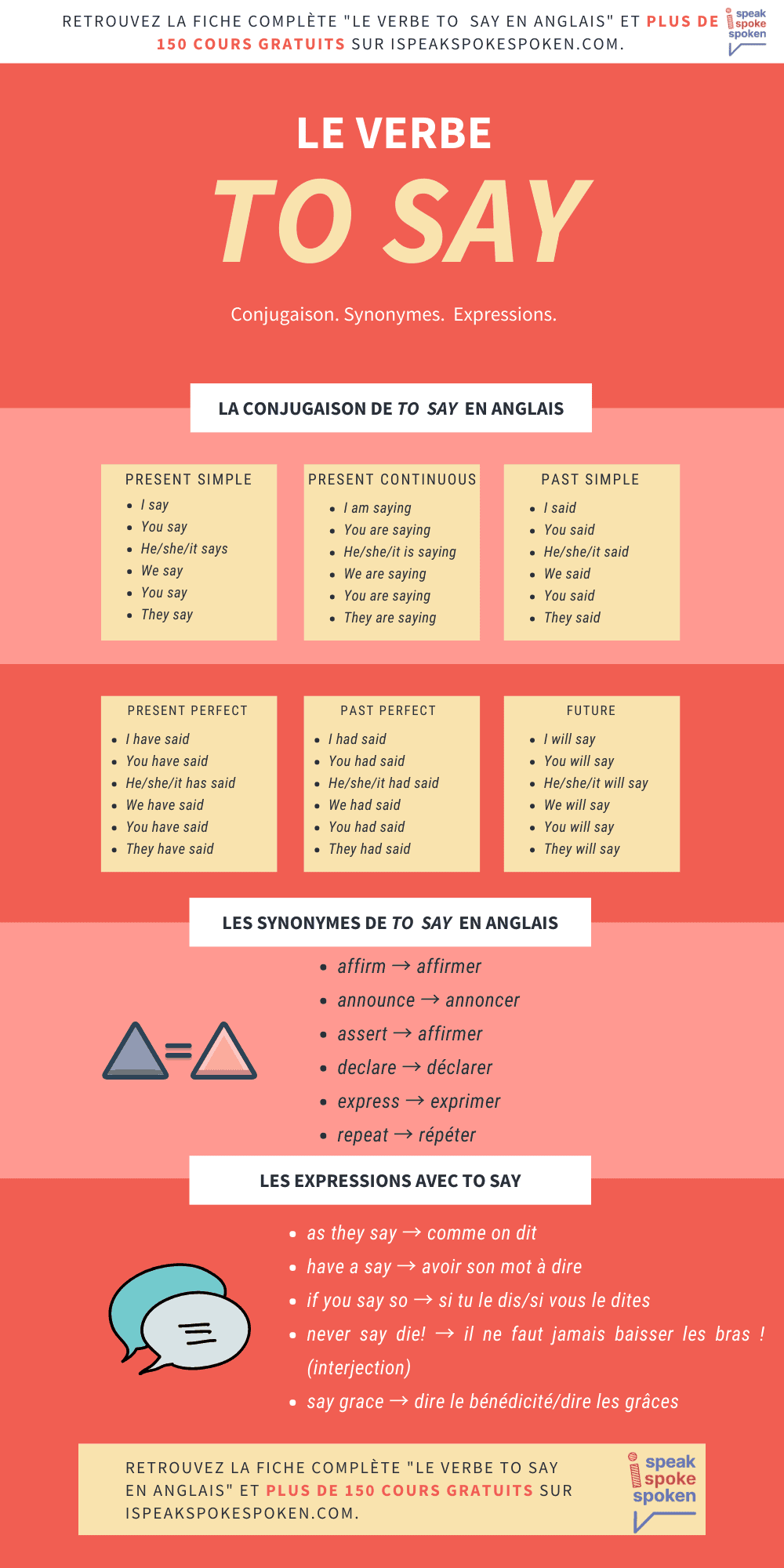iSpeakSpokeSpoken te lo cuenta todo sobre la conjugación de say en inglés y te revela sus definiciones, sinónimos y expresiones.
Índice →
Tablas de conjugación de say en inglés
Conjugación del verbo say en indicativo
Verbo say en present simple
- I say
- You say
- He/she/it says
- We say
- You say
- They say
Verbo say en present continuous
- I am saying
- You are saying
- He/she/it is saying
- We are saying
- You are saying
- They are saying
Verbo say en past simple
- I said
- You said
- He/she/it said
- We said
- You said
- They said
Verbo say en past continuous
- I was saying
- You were saying
- He/she/it was saying
- We were saying
- You were saying
- They were saying
Verbo say en present perfect
- I have said
- You have said
- He/she/it has said
- We have said
- You have said
- They have said
Verbo say en present perfect continuous
- I have been saying
- You have been saying
- He/she/it has been saying
- We have been saying
- You have been saying
- They have been saying
Verbo say en past perfect
- I had said
- You had said
- He/she/it had said
- We had said
- You had said
- They had said
Verbo say en past perfect continuous
- I had been saying
- You had been saying
- He/she/it had been saying
- We had been saying
- You had been saying
- They had been saying
Verbo say en future
- I will say
- You will say
- He/she/it will say
- We will say
- You will say
- They will say
Verbo say en future continuous
- I will be saying
- You will be saying
- He/she/it will be saying
- We will be saying
- You will be saying
- They will be saying
Verbo say en future perfect
- I will have said
- You will have said
- He/she/it will have said
- We will have said
- You will have said
- They will have said
Verbo say en future perfect continuous
- I will have been saying
- You will have been saying
- He/she/it will have been saying
- We will have been saying
- You will have been saying
- They will have been diciendo
Conjugación del verbo say en condicional
Verbo say en conditional present
- I would say
- You would say
- He/she/it would say
- We would say
- You would say
- They would say
Verbo say en conditional present continuous
- I would be saying
- You would be saying
- He/she/it would be saying
- We would be saying
- You would be saying
- They would be saying
Verbo say en conditional perfect
- I would have said
- You would have said
- He/she/it would have said
- We would have said
- You would have said
- They would have said
Verbo say en conditional perfect continuous
- I would have been diciendo
- You would have been saying
- He/she/it would have been saying
- We would have been saying
- You would have been saying
- They would have been saying
Otras formas
El infinitivo de say
- to say
Participio presente de say
- diciendo
Participio pasado de say
- said
El imperativo de say
- say
- let’s say
Nota: to say es un verbo irregular. Descubre la lista de verbos irregulares en inglés.
Definición de say en inglés
¿Qué significa el verbo say en inglés?
El Cambridge Dictionary ofrece varias definiciones del verbo say.
Veamos las principales:
1. To pronounce words or sounds, to express a thought, opinion, or suggestion, or to state a fact or instruction
He said he was innocent.
→ Dijo que era inocente.
2. To think or believe
Some people say that all opinions are equally good.
→ Hay quien piensa que todas las opiniones son iguales.
3. To give an opinion or suggestion about something
I’d say you’re about 35.
→ Yo diría que tienes unos 35 años.
4. To show what you think without using words
The expression on his face said it all.
→ La expresión de su rostro lo decía todo.
5. When something or someone is said to be a particular thing, that is what people think or believe about it, him, or her
Some plants are said to have healing properties.
→ Se dice que algunas plantas tienen propiedades curativas.
6. To give information in writing, numbers, or signs
When the clock says 10:00 pm, the game will be over.
→ Cuando el reloj marque las 22:00, el partido habrá terminado.
Para consultar la página completa del Cambridge Dictionary, haz clic aquí.
Phrasal verbs con say en inglés
Recordatorio: los phrasal verbs (o “verbos con partícula”) son verbos que, al ir seguidos de otra palabra (la partícula), completan o modifican su significado original.
No existen phrasal verbs basados en el verbo say. En cambio, algunos de sus sinónimos (ver más abajo) están llenos de ellos, como:
- speak: speak about, speak out, speak up…
- talk: talk around, talk over, talk through…
Sinónimos de say en inglés
Según el contexto, se puede sustituir el verbo to say por uno de los siguientes verbos:
- affirm → afirmar
- announce → anunciar
- assert → afirmar
- declare → declarar
- express → expresar
- pronounce → pronunciar
- repeat → repetir
- speak→ hablar
- tell→ decir
- utter → pronunciar
- verbalize → verbalizar
- voice → expresar
Expresiones con say en inglés
- as they say → como dicen
- have a say → tener voz y voto
- I say! (inglés británico) → opino/pienso que… (interjección coloquial)
- if you say so → si tú lo dices
- needless to say → no hace falta decir / ni que decir
- never say die! → ¡No te rindas nunca! (interjección)
- say grace → dar las gracias
- say the word → pedir ayuda (coloquial) / dar permiso
- say uncle (inglés americano) → admitir la derrota
- say what! → ¡que qué! (interjección familiar)
- you don’t say! → ¡no me digas! / ¡venga ya! (interjección coloquial)
Al igual que to run, to leave, to fly, to draw y to write, to say también es un verbo irregular. Por eso hay que prestar especial atención a las terminaciones en pasado.



